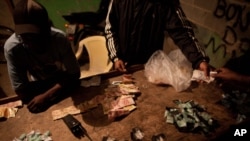Transnational crime has escalated dramatically in Central America and the Caribbean Basin since 2006. As United States Department of State's Director for Anticrime Programs in the Bureau of International Narcotics and Law Enforcement Affairs David Luna put it, “In recent years, our hemisphere has seen the rise of violent criminal networks vying for a greater market share in the global illegal economy. . . . They bring with them violence, firepower, and corruption.”
Speaking at the Caribbean Basin Coastal Surveillance Security Summit in mid-March, Mr. Luna said that the United States is ready to work with partners in Mexico, Central America and the Caribbean basin to “break the power of the cartels and make it more difficult for drugs to enter North American markets. And not only drugs. These same networks are also trafficking humans, weapons, natural resources, and counterfeits that pose health and safety risks.”
This is a complicated task, inasmuch as sustained pressure on criminal gangs in one area causes them to move their operations elsewhere, causing “an increase in crime and violence in another part of the hemisphere,” or elsewhere in the world, said Mr. Luna. “We must think strategically and collectively to fight cross-border illicit and criminal threats and mitigate their harms to our communities.”
Money is the common denominator of the criminal gangs and their operations. Criminals hide the proceeds of their illegal activities in legal structures, filtering the money through legitimate financial institutions and into the global market. Their criminal activities can have negative consequences for the economies of the countries they exploit.
“We will not be successful in this fight unless we aggressively combat corruption, strengthen laws, and increase cooperative capacities to track the laundering of corrupt and criminal proceeds,” said Mr. Luna. So, the United States is strengthening our partnerships in the Caribbean, the Americas, and globally, and providing our partners with training, equipment, operational support, and new technologies to investigate and apprehend illicit actors.
“The United States stands ready to continue working with [the Caribbean nations and other international partners] to reduce illicit trafficking across our hemisphere and beyond,” said David Luna, “and to shield our citizens from the growing threats of transnational crime, corruption, and terrorism.”
Speaking at the Caribbean Basin Coastal Surveillance Security Summit in mid-March, Mr. Luna said that the United States is ready to work with partners in Mexico, Central America and the Caribbean basin to “break the power of the cartels and make it more difficult for drugs to enter North American markets. And not only drugs. These same networks are also trafficking humans, weapons, natural resources, and counterfeits that pose health and safety risks.”
This is a complicated task, inasmuch as sustained pressure on criminal gangs in one area causes them to move their operations elsewhere, causing “an increase in crime and violence in another part of the hemisphere,” or elsewhere in the world, said Mr. Luna. “We must think strategically and collectively to fight cross-border illicit and criminal threats and mitigate their harms to our communities.”
Money is the common denominator of the criminal gangs and their operations. Criminals hide the proceeds of their illegal activities in legal structures, filtering the money through legitimate financial institutions and into the global market. Their criminal activities can have negative consequences for the economies of the countries they exploit.
“We will not be successful in this fight unless we aggressively combat corruption, strengthen laws, and increase cooperative capacities to track the laundering of corrupt and criminal proceeds,” said Mr. Luna. So, the United States is strengthening our partnerships in the Caribbean, the Americas, and globally, and providing our partners with training, equipment, operational support, and new technologies to investigate and apprehend illicit actors.
“The United States stands ready to continue working with [the Caribbean nations and other international partners] to reduce illicit trafficking across our hemisphere and beyond,” said David Luna, “and to shield our citizens from the growing threats of transnational crime, corruption, and terrorism.”






